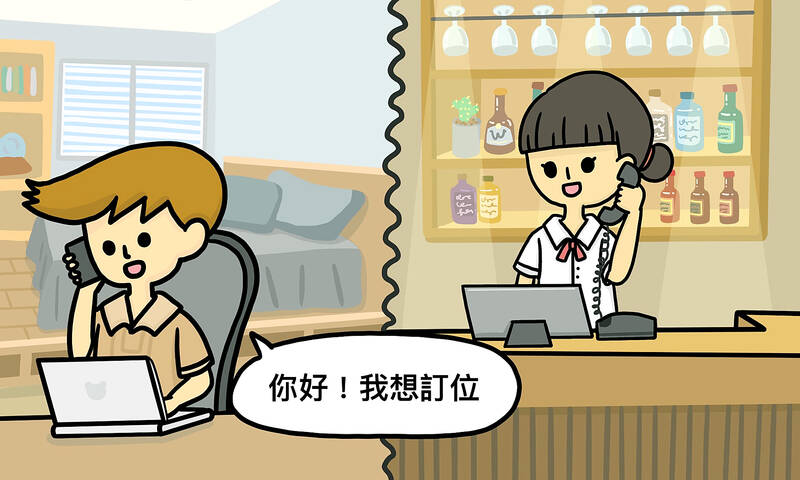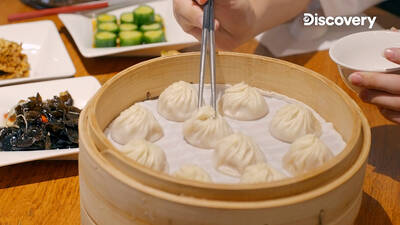對話 Dialogue
馬克:你好!我想訂位。
Make: Nǐ hǎo! Wǒ xiǎng dìngwèi.

餐廳服務生:好,請問您有幾位?訂什麼時候?
Cāntīng fúwùshēng: Hǎo, qǐngwèn nín yǒu jǐ wèi? Dìng shénme shíhòu?
馬克:我們有五個人,我要訂五月十四號的中午十二點半。
Make: Wǒmen yǒu wǔ ge rén, wǒ yào dìng wǔ yuè shísì hào de zhōngwǔ shí’èr diǎn bàn.
餐廳服務生:好的,請問您怎麼稱呼?
Cāntīng fúwùshēng: Hǎo de, qǐngwèn nín zěnme chēnghū?
馬克:我叫馬克,馬鈴薯的馬、巧克力的克。
Make: Wǒ jiào Mǎkè, mǎlíngshǔ de “mǎ”, qiǎokèlì de “kè”.
餐廳服務生:好的,馬克先生,方便留下您的聯絡電話嗎?
Cāntīng fúwùshēng: Hǎo de, Mǎkè xiānshēng, fāngbiàn liú xià nín de liánluò diànhuà ma?
馬克:我的電話是2538-1111。
Make: Wǒ de diànhuà shì 2538-1111.
餐廳服務生:好的,這樣就可以了!五月十四號見。
Cāntīng fúwùshēng: Hǎo de, zhèyàng jiù kěyǐ le! Wǔ yuè shísì hào jiàn.
翻譯 Translation
Mark: Hello! I want to make a reservation.
Waitress: OK, for how many? And what time would you like to reserve?
Mark: There are five of us, and I want to make an appointment for 12:30 on May 14.
Waitress: OK, what’s your name (what should I call you)?
Mark: My name is M?ke (Mark), “m?” as the character in m?lingsh? (potato), and “ke” as the character in qi?okeli (chocolate).
Operator: OK, Mr. Mark. Could you please leave your contact number?
Mark: My phone number is 2538-1111.
Operator: OK, that’s fine. See you on May 14.
單字片語 Vocabulary
1. 訂位 (dìngwèi) to book, to make a reservation
2 . 半 (bàn) half
3. 稱呼 (chēnghū) to call, to address
4 . 馬鈴薯 (mǎlíngshǔ) potato
5. 留下 (liú xià) to leave
6 . 聯絡電話 (liánluò diànhuà) contact number
7 . 這樣 (zhèyàng) like this
教材音檔 Audio Files
教材影片 Video Files:
https://www.instagram.com/celc.nou_tw/guide/_/17999106352646292/
實踐大學華語中心提供
By Shih Chien University Chinese Language Center: https://chineseusc.com/

US President Donald Trump has renewed his ambition to take control of Greenland for national security reasons and questioned whether Denmark has any legal right to the Arctic island. The debate has revived scrutiny of how Greenland became part of Denmark, its current self-rule and path to independence, and Washington’s military footprint. HOW DID DENMARK GET GREENLAND? Greenland was inhabited by Inuit peoples from Asia and North America intermittently from around 2,500 BC. Around 985 AD, Vikings led by Erik the Red settled in southern Greenland, farming and building churches. Around the same time, ancestors of today’s Inuit arrived, living as hunters

Owls have long fascinated people with their distinctive appearance and mysterious habits. These nocturnal birds possess large, round eyes and a flat facial disc. Their feathers come in shades of brown, gray, or white, helping them blend easily into the darkness. The most remarkable trait of owls is that they can turn their heads without damaging blood vessels. Contrary to popular belief, they can only rotate their heads up to 270 degrees, not 360 degrees. Owls have 14 cervical vertebrae, which is twice as many as humans. This special physical structure compensates for their inability to move their eyes within their

A: Bloomberg just released its annual travel guide, titled “25 Best Places to Travel in 2026.” What were the best Asian destinations? B: There were actually six Asian hotspots: Taiwan’s Taipei, Malaysia’s Penang, Kazakhstan’s Almaty, Indonesia’s Rote Island, India’s Tiger Reserves, and Oman. A: With its mix of traditional food and modern cuisine, Taipei has become a rising food capital in Asia. B: As Bloomberg reported, “Taiwan is a place that bubbles up in culinary conversation because of its famed beverage, bubble tea, and its early adoption of modern night markets.” A: And Din Tai Fung has now

AI-generated summaries are shaking up the media world. Tools like Google’s AI Overviews now provide users with direct answers above the search results, resulting in fewer people clicking on news links. For publishers who rely on that traffic to generate advertising revenue, this shift is hitting hard. The fallout is measurable. Many sites have seen a sharp drop in traffic since AI summary features rolled out. An analysis revealed that a news outlet that had once ranked first on Google lost up to 79% of its traffic when its link appeared beneath an AI-generated summary. Statistics also show that